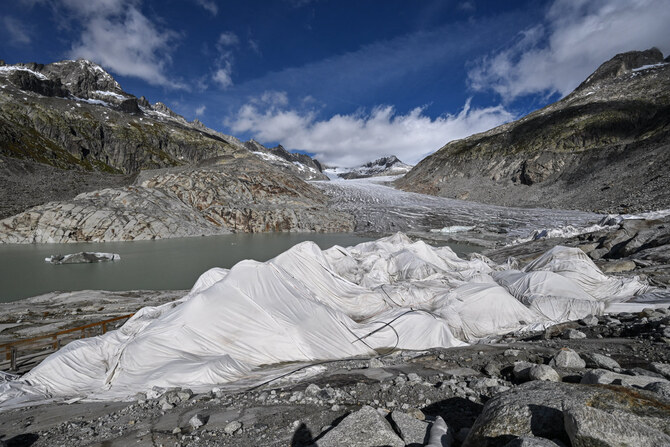RIYADH: From Argentina and South Sudan to Spain, Indonesia, and even Saudi Arabia, recent episodes of flash flooding around the world have cost numerous lives, displaced thousands, and destroyed infrastructure.
What is causing this flurry of flash flooding? Many factors come into play, from poor urban planning to improper resource management, but some argue the major culprit is climate change.

“Numerous environmental factors affect the water cycle, but temperature is perhaps the most important one,” Hylke Beck, assistant professor of earth science and engineering at Saudi Arabia’s King Abdullah University of Science and Technology, told Arab News.
“Earth’s water cycle is all about movement. Water is constantly shifting between the ocean, land, and atmosphere,” Beck continued. Water rises as it evaporates, after which it cools, condenses into clouds, and then falls as rain or snow. Some of that water runs off into rivers and oceans, some infiltrates the ground, becoming groundwater, and some is taken up by plants.
“It’s a continuous cycle that keeps water moving and sustains us and other organisms,” Beck explained.
But what role does temperature play in the process? Warmer air holds more moisture. For every degree the planet warms up, the atmosphere can store approximately seven percent more water.
This extra moisture means that, when conditions are suitable, storms have a larger water supply to work with, resulting in heavier rainfall.
The Journal of Applied Meteorology and Climatology states that from 1979 to 2019, Saudi Arabia’s climate has warmed by 2.1 degrees Celsius — almost three times the global average.

Vehicles are submerged in water following flash floods in the holy city of Makkah on May 9, 2014. (AFP)
At the other end of the extreme, shifts in the water cycle have also led to more droughts, since higher temperatures also accelerate water evaporation, meaning more moisture is “pulled” from the ground at a faster rate. This dries out soil and makes droughts worse if there is not enough rain to replace it.
Longer dry spells and less frequent but heavier rainfall discourages crop growth and can lead to desertification.
In the Kingdom, stronger winds and drier soil causes more frequent and harsher sandstorms, harming the country’s agriculture and air quality. Air pollution can also change how clouds form and impact the amount of rainfall.
“In some places, increased evaporation can lead to more rainfall, but not necessarily where it’s needed,” said Beck. “Some regions get soaked, while others dry out even more.”

Sprinklers irrigate a rice field in Mishkhab in Iraq's Najaf province on July 8, 2024, as four consecutive years of drought and declining rainfall have strangled rice production in the country. (AFP/File)
Depending on where and how the moisture moves, warming can intensify both extreme rainfall and drying.
Changes in land also play an important role. Cutting down trees reduces transpiration, the urbanization of cities increases run-off, and damming rivers changes the direction of water flow.
Then there are also natural factors which can exacerbate man-made influences.
“Large-scale climate patterns like El Nino and La Nina (alter) where rain falls and for how long,” said Beck.

Both of those patterns are part of a natural cycle called El Nino-Southern Oscillation, El Nino is the phase in which the Pacific Ocean’s surface becomes warmer than usual. La Nina is the phase in which they are cooler. Both lead to changes in global weather, causing heavier rainfall in some areas and dryer conditions in others.
“Climate change is essentially throwing the whole system out of balance,” said Beck. “The result is more extremes — wetter wet seasons, drier dry seasons, and more unpredictable weather generally.”
Beck added that organizations like World Weather Attribution do crucial work in the field of climate monitoring by analyzing how climate change influences extreme events and how human activities shape the Earth’s water cycle.



































